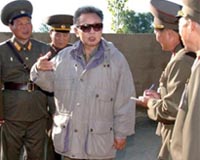 |
Washington (AFP) April 28, 2011 With the threat of war hanging over the Korean peninsula in 1994, Jimmy Carter flew to Pyongyang and reached a surprise deal with the reclusive regime to freeze its nuclear program and start talks. Seventeen years later, the former US president went back to North Korea this week but with no breakthrough, no meeting with the top leader and with Washington and Seoul cautious at best over his calls for reconciliation. At age 86, Carter maintains a frenetic pace and zeal for trying to mediate some of the world's most intractable trouble-spots. Just a few weeks earlier, Carter went to Cuba for extended talks with the island's communist leaders. Carter, who did not meet leader Kim Jong-Il but said he received a message from him, said Thursday in Seoul that the regime was ready for unconditional talks with the South. He also made a forceful appeal for aid to feed the North. Korea expert L. Gordon Flake said that North Korea appeared to put nothing new on the table for Carter, a far cry from the 1994 visit or even the former president's trip to Pyongyang last year when he freed a jailed American. "The Carter visit to me represents the diplomatic application of the economic law of diminishing returns," said Flake, executive director of the Mansfield Foundation think-tank. "There was no shift in North Korean position and no change in North Korea's rhetoric that would, if I were Washington or Seoul, give me any cause to re-evaluate where things stand," he said. Analysts said that North Korea's call for unconditional talks was not necessarily a conciliatory move, but instead part of its hopes to restart dialogue without accounting for recent tensions. North Korea in November shelled a civilian part of the South for the first time since the 1950-53 Korean War, months after Seoul blamed the North for the sinking of one of its warships that claimed 46 lives. US President Barack Obama's administration, despite favoring dialogue around the world, has pursued a policy of "strategic patience" with the North, saying that it must make amends with the South and clearly recommit to past denuclearization accords before any substantive talks. Steve Clemons, a senior fellow at the New America Foundation, welcomed the initiative by Carter, saying that North Korea can be dangerous when ignored. "America's bandwidth is at overcapacity right now with Libya, Afghanistan, Egypt, Syria and whatever else is going on, and North Korea is feeling neglected," Clemons said. "So if there are cheap and easy ways to stroke the North Korean ego and need for attention, then I'm all for it," he said. Clemons said that Carter and the fellow leaders known as The Elders -- former Finnish president Martti Ahtisaari, ex-Norwegian prime minister Gro Harlem Brundtland and former Irish president Mary Robinson -- were creating "a short-term shock absorber." But Carter, who is deeply unpopular with many US conservatives, triggered outrage in parts of Washington when he accused the United States and South Korea of a "human rights violation" for, in his view, withholding food aid from the North for political reasons. US Christian relief groups say that North Korea will run out of food within months. But Washington and Seoul want further assessments, with some officials charging that the regime may be exaggerating the needs as it prepares national celebrations next year. Bruce Klingner, a senior research fellow at the conservative Heritage Foundation, called Carter's statement on food aid "amazingly bizarre, given the lack of comment from any of his delegation on North Korea's atrocious human rights record." "If The Elders continue their high-profile involvement in North Korea and continue to serve as a mouthpiece for the regime, then it will help North Korea's charm offensive," he said. "If it's sort of a one-time involvement, then their effort will just dissipate," he said. Robert King, the US envoy for human rights in North Korea, at a forum Wednesday denied any political reason for holding off on food aid. He welcomed Carter's visit as "very useful," saying it could expose the isolated nation to outside thinking.
Share This Article With Planet Earth
Related Links Learn about nuclear weapons doctrine and defense at SpaceWar.com Learn about missile defense at SpaceWar.com All about missiles at SpaceWar.com Learn about the Superpowers of the 21st Century at SpaceWar.com
 N. Korea's Kim ready for S. Korea summit: Carter
N. Korea's Kim ready for S. Korea summit: CarterSeoul (AFP) April 28, 2011 North Korean leader Kim Jong-Il says he is willing to hold talks with the United States and South Korea, including a summit with the South's leader, former US president Jimmy Carter said Thursday. Carter was speaking on his return from a visit with three other retired world leaders to Pyongyang, a mission aimed at easing high inter-Korean tensions, assessing food shortages and encouraging nu ... read more |
|
| The content herein, unless otherwise known to be public domain, are Copyright 1995-2010 - SpaceDaily. AFP and UPI Wire Stories are copyright Agence France-Presse and United Press International. ESA Portal Reports are copyright European Space Agency. All NASA sourced material is public domain. Additional copyrights may apply in whole or part to other bona fide parties. Advertising does not imply endorsement,agreement or approval of any opinions, statements or information provided by SpaceDaily on any Web page published or hosted by SpaceDaily. Privacy Statement |